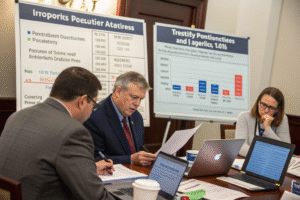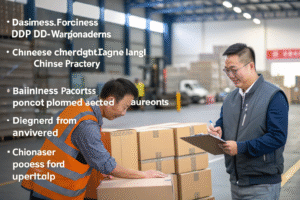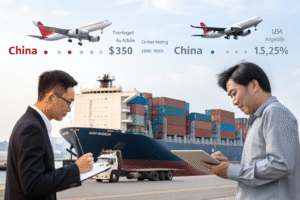Global trade compliance isn’t just paperwork—it’s the gatekeeper of international shipping. Miss a single rule, and you could be staring at stalled containers, surprise fines, or worse, seized goods. For importers, trying to navigate the jungle of regulations solo feels like walking blindfolded through a minefield.
Freight forwarders cut through the chaos by managing customs documents, staying on top of shifting regulations, assigning tariff codes with precision, and steering clients through constantly changing rules. Their expertise keeps cargo moving, wallets safe, and stress levels down.
If compliance headaches keep slowing you down, a forwarder is the partner that helps you breathe easier.
How do freight forwarders manage complex documentation?
Paperwork is where most shipments go sideways. A missing stamp or wrong code can trap cargo at the border for weeks. Forwarders obsess over details so their clients don’t have to.
They draft invoices, bills of lading, packing lists, and origin certificates with pinpoint accuracy. By triple-checking everything, they keep customs happy and shipments flowing without hiccups.

Why is documentation such a big deal?
Because border agencies live and die by the fine print. U.S. Customs and Border Protection and European Commission Trade warn that incomplete documents are the number-one cause of delays.
Can forwarders handle electronic filings?
For sure. Many now use systems like CargoWise or official e-customs portals to file digitally—speeding up clearance and slashing error rates.
Do freight forwarders keep up with shifting regulations?
Trade rules never sit still. Tariffs, duties, and sanctions can change overnight. Importers trying to track it all usually get blindsided. Forwarders make it their full-time job to stay sharp.
They monitor global rule changes, alert clients when something shifts, and tweak shipping strategies on the fly. Their global networks often catch changes before smaller businesses even hear about them.

How do forwarders stay updated?
By watching organizations like the World Trade Organization and World Customs Organization, plus staying in direct contact with local customs agencies.
Can this prevent ugly surprises?
Absolutely. Staying a step ahead means importers avoid sudden duty hikes or compliance penalties. Articles from Freightwaves and Supply Chain Digital show how proactive compliance saves businesses a ton of money.
How do freight forwarders classify tariffs correctly?
Misclassify a product, and suddenly your duties skyrocket—or worse, customs flags you for fraud. Forwarders step in to make sure the numbers line up.
They assign Harmonized System (HS) codes with precision, keeping duties fair and shipments compliant. That accuracy avoids both overpaying and underpaying, while keeping customs authorities off your back.

Why are HS codes so tricky?
Because even tiny differences in product detail can shift the code—and duties along with it. The World Customs Organization and International Trade Administration stress just how technical classification gets.
Can forwarders actually lower duties?
Yes. By applying correct codes and using trade agreements strategically, forwarders can cut duty costs. Insights from OECD Trade and International Chamber of Commerce back this up.
Why does compliance expertise build importer confidence?
Compliance isn’t just about dodging fines—it’s about peace of mind. Importers want certainty their cargo won’t get stuck mid-route. Forwarders deliver that certainty.
Their expertise makes supply chains predictable, builds trust with customs, and reassures clients their shipments are in safe hands. That kind of reliability builds lasting partnerships.

How does compliance expertise protect businesses?
It prevents fines, delays, and seizure disasters. Reports from Transport Topics and InBound Logistics show compliance failures are some of the priciest mistakes in trade.
Can forwarders lock in loyalty this way?
Definitely. Importers stick with partners who keep them out of trouble. Studies from Harvard Business Review and Logistics Management prove trust in compliance builds long-term loyalty.
Conclusion
Freight forwarders aren’t just moving boxes—they’re navigating the compliance minefield for their clients. By mastering documents, staying ahead of regulatory curveballs, classifying tariffs correctly, and keeping importers in the clear, they turn a major pain point into a competitive edge. For any business sourcing overseas, forwarders are the difference between sleepless nights and a supply chain that runs like clockwork.









